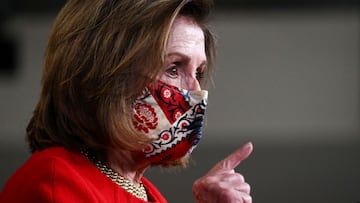Second stimulus check update: US coronavirus relief bill
What's happening with talks on two potential stimulus bills? Do they include provisions for $1,200 checks and when could either one be passed into law?

Over the last six months, lawmakers in the Capitol have struggled to agree on a second large-scale stimulus package to help Americans survive the economic fallout of the pandemic. But after an initial swell of bipartisan sentiment to pass the CARES Act back in March, the two parties have remained far apart since then.
Both Republicans and Democrats agree that a stimulus needs to be passed, but the overall size and whether it should include a second round of $1,200 payments to qualifying individuals remain major points of tension.
The negotiators Nancy Pelosi for Democrats and Steven Mnuchin and Mitch McConnell on the Republican side have been at loggerheads on specifics of a significant second bill since June.
While Pelosi has dropped the $3.4tn overall spend proposed in the Democrats’ failed HEROES Act to $2.2tn, Mnuchin raised the White House’s offer from the $1tn in the HEALS Act - a bill proposed by GOP senators in July - to $1.9tn.
What is happening right now with stimulus bill talks?
The good news is that help is likely to come twice. The bad news is that it may still take a while for individuals to get those coveted $1,200 stimulus checks, if they come at all.
Since the election things have reached breaking point with a looming 11 December deadline for Congress to fund the government thus avoiding a shutdown. There’s hope of a smaller bill passing before Christmas during Donald Trump’s lame duck session, then there are rumours that Joe Biden has something up his sleeve for January. It’s unlikely that the pre-inauguration option will include a stimulus check for individuals at all.
Because the options are now split in two, we’ll break it down.
New $908 billion bipartisan stimulus bill
A brand new bill put together by bipartisan moderates proposes spending much less generous than the Democrats would like, but significantly more than Republicans have been prepared to offer thus far.
The proposal was presented by a bipartisan group of moderate House and Senate members last week at a press conference. The bill amounts to a middle-ground option between McConnell’s current proposal and the Democrat House bill passed in October. The plan calls for $908 billion on a range of covid-19 relief measures.
During the presentation Mitt Romney, Republican of Utah said “I happen to be a deficit hawk. I don’t like borrowing money. I don’t like spending money we don’t have. But the time to borrow money is when there is a crisis. And this is a crisis.”
Sen. Mitt Romney on bipartisan deal today: "I'm a deficit hawk ... This is not a $1.8 trillion stimulus bill. This is a relief measure -- half that amount"
— Jeff Stein (@JStein_WaPo) December 1, 2020
He also says that $908B pricetag includes repurposing $560B in Cares $. "The amount of new money is actually $348B"
Part of the bill provides for four months of additional unemployment benefits but in a compromise the top-up would be just $300 as opposed to the $600 Democrats were seeking. The bill also calls for state and local funding to the tune of $160 billion, which will pay for front line workers.
If the Senate fails to pass a vote on the $908bn bill on 10 December, the next possible date for a bill to be voted on would be in February.
However there is no provision in the bipartisan proposal for another $1200 stimulus check.
Yet, some of my colleagues think that another stimulus check isn't needed in the next relief bill.
— Rashida Tlaib (@RashidaTlaib) December 7, 2020
It's irresponsible not to include #DirectCashRelief during this crisis. https://t.co/fg4L4VVuLt
Senate Republican leaders quickly undercut the plan, offering up their own bare-bones proposal that stood little chance of passing through both chambers.
Second stimulus check: will Joe Biden save the day?
With prospects of a second stimulus check before Joe Biden is in the White House come 20 January waning, hopes are now being pinned on Joe Biden’s plans in 2021 to bring much-needed help to individuals struggling through the coronavirus-induced economic crisis.
"If we don't act now, the future will be very bleak. Americans need help and they need it now. And they need more to come early next year," said Biden last week.
A government report on Friday showed the labour market slowing in November as the covid-19 pandemic eclipsed its levels of the spring. Some 179,124 new infections are reported each day, a record, and more than 276,000 Americans have died of the disease.
The president-elect said Friday's "grim" jobs report showed that economic recovery is stalling, urging Congress to pass a covid-19 relief bill immediately and follow up with "hundreds of billions of dollars" in more aid in January.
"Any package passed in the lame-duck session is not going to be enough overall. It's critical but it's just a start. Congress is going to need to act again in January," Biden told reporters in his hometown of Wilmington, Delaware.
"We're looking at hundreds of billions of dollars," he said.
So what do Republicans want?
So we know that Biden and many Democrats are in favour of a wider-reaching bill that includes checks send out to individuals who qualify, but what is it that the Republicans want exactly that’s causing the deadlock? Something “highly targeted”, apparently.
Majority Leader Mitch McConnell, who has proven to be one of the staunchest opponents to the HEROES Act, leads the Republican-held Senate, but perhaps not for long. The Democrats’ $2.2 trillion package is seen by McConnell as too far-reaching, so he’s tabled his own.
McConnell’s ‘skinny’ bill is a $500 billion package that includes support for small businesses and an extension of unemployment benefits but offers no further direct relief. Earlier this month, McConnell told reporters that he does not want another bill the size of the CARES Act: "I don't think the current situation demands a multitrillion-dollar package. So I think it should be highly targeted.” His plan looks to be similar to the $500 billion McConnell has been pushing for months but that Democrats have long said is insufficient.
Upon retaining his seat in the Senate for Kentucky, McConnell was optimistic about the chances of another coronavirus relief bill before 2021: “I think we need to do it and I think we need to do it before the end of the year.”
Commentators believe that the reluctance on Republicans’ part to deliver a comprehensive package soon came off the back of news that several vaccines are unexpectedly highly effective.
Two birds, one stone with vaccine stimulus proposal
John Delaney, who was the House representative for Maryland’s sixth district between 2013 and 2019, is proposing paying Americans $1,500 in exchange for being vaccinated, in what he says is a "two birds, one stone" move that would help end the pandemic and alleviate the economic crisis it has created.
How badly does the US economy need stimulus?
A new report from the Economic Policy Institute recommends that “Congress provide debt-financed fiscal support of $2 trillion between now and the middle of 2022, and then continue support on the order of $400 billion annually between then and the end of 2024, with a slow phaseout of this aid thereafter.”
Related stories
With millions of Americans unemployed directly owing to the coronavirus pandemic and the last trickles of enhanced unemployment benefits due to dry up come 26 December, Josh Bivens explains that this plan needs to “first stop the economic bleeding and then repair the aspects that have been “rotted away” in order to rebuild a resilient economy.”
Add to this the ticking time bomb of existing trickling benefits implemented by the CARES Act in March that are due to finally expire by 31 December 2020 and things start looking pretty desperate for a lot of Americans.
If Congress and President Trump fail to act by the end of December:
— Joe Biden (@JoeBiden) December 5, 2020
- 12 million Americans will lose unemployment benefits
- Emergency paid leave will end
- The moratorium on evictions will expire
The situation is urgent. Americans need help and they need it now.


